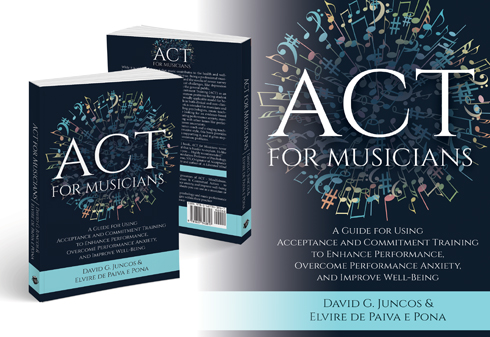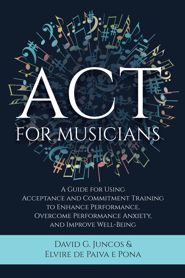
I recently published my first book entitled ACT for Musicians: A Guide for Using Acceptance and Commitment Training to Enhance Performance, Overcome Performance Anxiety, and Improve Well-Being with Universal Publishers.
In it, my co-author Elvire de Paiva e Pona and I advocate for a transdisciplinary approach to treating music performance anxiety and other performance-related challenges faced by my musicians. This means both clinical & non-clinical professionals alike can be trained to be “ACT practitioners” who can treat MPA and several other issues, and our book is the first place such professionals can start their ACT training experience. We also advocate for an evidence-based model of care for professionals who work with musicians, similar to the model you’d find in clinical psychology and medicine. In other words, we made sure to accurately disseminate information about ACT and the research support for it as a MPA treatment, and as a treatment for other performance problems, so readers of the book can make smarter decisions about the type of therapy or coaching intevention they want, and then they can seek out that type of practitioner and start working with them. Having that ability to find a practitioner(s) who is trained in an empirically supported therapy or coaching model like ACT enhances the likelihood they’ll be helped, which protects the public against bad treatment.
To preview the first 25 pages of ACT for Musicians here.
If you are ready to order visit the book’s order page at universal-publishers.com.

SYNPOSIS
While it is widely recognized that music contributes to the health and well-being of societies, the reverse is not necessarily true. Being a professional musician is a rewarding yet challenging occupation, and the results of newer survey studies show musicians experience psychological challenges, like depression and anxiety, at much higher rates than adults in the general public.
This book introduces Acceptance and Commitment Training (ACT) as an intervention for addressing some of the most common problems facing student and professional musicians across the world. A broadly applicable model for behavior change, ACT can be used by professionals in both clinical and non-clinical settings with adequate training. Thus, this book is intended for musicians and practitioners from various backgrounds, including psychologists, music teachers, performance coaches, and others, who are looking for an evidence-based approach for enhancing music performance, treating performance anxiety, managing pain and recovery from injury, and coping with other issues like perfectionism, procrastination, shame, burnout and career uncertainty. Written by a clinical psychologist/performance coach and a singing teacher/vocalist in a conversational yet highly informative style, this book provides a detailed discussion of ACT and the research supporting it, and it gives step-by-step instructions for using it to treat those common problems.
INSIDE THE BOOK YOU’LL FIND:
* Practical guides on how to apply the six processes of ACT–Mindfulness, Acceptance, Defusion, Self-as-Context, Values & Committed Action–to enhance performance, overcome performance anxiety, and improve well-being
* Exercises, techniques, metaphors and worksheets you can use as a musician or a practitioner
* Exclusive interviews with leading experts in psychology and music performance about how they use ACT and similar strategies within their practice
* Foreword by renowned performance enhancement coach, Phil Towle
WORDS OF PRAISE
An amazingly thorough and carefully crafted book, ACT for Musicians never talks down to the reader, or skips over material that is harder to explain. It’s like having an instructor who refuses to give up on you. It covers almost every imaginable issue faced by musicians, and does so with honesty, gentleness, and care. If you want a superficial pop psych, fly over book, filled with empty tricks and happy talk, look elsewhere. If you are ready to get serious about learning, practicing, and mastering the psychological skills needed to create and perform at your best, you’ve come to the right place. Highly recommended.
–Steven C. Hayes, PhD, Foundation Professor of Psychology, University of Nevada, Reno, NV, Originator of Acceptance and Commitment Therapy and author of A Liberated Mind
ACT for Musicians is a ground-breaking book, full of useful techniques and interventions that will help musicians and performers tackle performance anxiety. Musicians and their teachers will find the ACT approach explored in this book invaluable. In addition, other helping professionals who work in this field including coaches, psychotherapists, and psychologists will gain insight and knowledge into how ACT can be applied so that musicians can also improve their performance quality. David Juncos and Elvire de Paiva e Pona are to be congratulated for writing this trailblazing book.
–Stephen Palmer, PhD, Professor of Practice at the Wales Academy for Professional Practice and Applied Research, University of Wales Trinity Saint David, UK
This phenomenal resource is written with an acute awareness of musicians as students, performers and teachers. The authors’ integration and application of their expertise in performance, psychology and education enables an explanation of the theory and practice of ACT in a thorough and accessible way. Extensive exercises and examples are clearly formulated to entice musicians to immediately and compassionately incorporate the strategies into their practice. As a consulting psychologist, university lecturer and researcher specialising in music performance anxiety, I have seen firsthand how the material contained in this book has enabled students and patients to reach new levels of their potential. This book will be my go-to resource for using ACT to help musicians at all levels and stages. I encourage you to make it yours, too.
–Margaret Osborne, PhD, Registered Psychologist, Senior Lecturer in Psychology and Music, University of Melbourne, Australia
Conductors often hit a wall when trying to understand how musicians cope with personal constraints. This happens because they fail to address the underlying physical and psychological issues that manifest in musicians. Both conductors and musicians lack the knowledge of the tools needed to cope with the pressure of musical performance. This magnificent book brings thorough insight and a valuable path to finally create a healthy and productive environment to make music in small or large ensembles. This process not only helps single performers but also conductors who need to be aware of their fellow musicians’ performance struggles. Bravo Dr. Juncos and Ms. De Paiva e Pona!
–Paulo Vassalo Lourenco, DMA, Conductor, Head of Choral Conducting Program Escola Superior de Música de Lisboa, Portugal
It has always struck me as odd that, of the thousands of hours that we in the performing arts devote to cultivating our craft, so few of those are dedicated to perhaps the most essential skill of all: how to execute that craft under pressure. As a longtime sufferer of MPA (finally, a name for this thing that I’ve been enduring for so long), nothing was more frustrating to me than not being able to demonstrate on stage that which I was fully capable of in the practice room as a result of an unlucky biochemical response to stress I felt I simply could not control. But, of course, therein lies the essential paradox clarified so eloquently and so helpfully in this wonderful book. Years of ‘trying to control’ my anxiety by denying it, fighting it, faking it ’til I made it (except I never quite did), in effect made my anxiety far worse. Applying some of the basic tenets of ACT in recent years has shown me that the somewhat counterintuitive process of accepting and acknowledging my fears, and mindfully attending to them, has yielded more successful and more enjoyable performances.
Having recently pivoted to the role of educator, I am so grateful to be able to add this comprehensive, evidence-based, and ever accessible resource to my pedagogical toolkit. It is a wonderful feeling to know that I will be able to offer hope to a new generation of performers who may in the past have felt doomed to a lifetime of subpar performances on account of anxiety.
Thank you, Dr. Juncos & Ms. De Paiva e Pona, and as we say in the opera world, Bravissimo!
–Kiera Duffy, MM, Soprano, Head of Undergraduate Voice Studies, University of Notre Dame, South Bend, IN
It is rare to find decent research that merges Psychology and Musical performance. As a professional singer with a degree in Psychology, I found ACT for Musicians very enlightening in this field that still holds so many questions. Fascinating, practical, and with an empirical curiosity that approaches a much needed field of research. I highly recommend any performer to read it and benefit from the many tools to help navigate the mind: an ingredient so vital and yet neglected to a successful music performance.
–Nuno Queimado, BA, Professional Actor and Singer based in London, West End credits include Hamilton, Jesus Christ Superstar, and From Here to Eternity
The effectiveness of previously available music performance anxiety treatments was always questionable in my experience. A shift in focus from intervention to therapy based on the ideas of acceptance and commitment is the way forward not only for being an approach for addressing performance anxiety in conceptual and practical terms, but also for becoming a healthier & more complete individual. This shift is supported by the data presented where we see once anxious, shaken musicians with nowhere to turn, now being able to face their fears and achieve success. In my forty years of performance experience, I’ve utilized various methods of reducing performance anxiety, mostly by trying to suppress those uncomfortable feelings – but this book is rooted in compassion and acceptance, and in the understanding of the psychological complexities involved in the world of the performing arts. It also provides practical exercises and solutions and is without a doubt a game-changer. Any musician that reads it I have no doubt will agree, but I would go as far as to say that any musician, coach, or professor of music should read this book because philosophically, conceptually, and statistically there is no doubt it can change the struggles of music performance for the better. –Pablo Cohen, DMA, Classical Guitarist, Associate Professor of Music of Latin America & Classical Guitar, Whalen Center for Music, Ithaca College, Ithaca, NY
